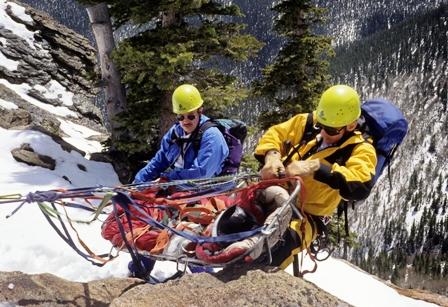Should search-and-rescue (SAR) subjects be billed for the cost of their rescue? It's long been a thorny issue, one that organizations that respond to SARs long have opposed.
The topic has been broached here on the Traveler in the past, but in light of our recent article on staying safe in the parks, and that of the rescue of a couple in Dinosaur National Monument, it seems fitting to revisit it, particularly in light of a news release from the National Association for Search and Rescue.
The release, issued last week by NASAR, the Mountain Rescue Association, the Colorado Search and Rescue Board, the International Association of Dive Rescue Specialists, the United States Coast Guard and the National Park Service, reiterated those groups' stance that they all either oppose billing, or do not bill, people after a search-and-rescue operation.
“Although it remains a local decision, billing for search and rescue operations is a dangerous practice that should be avoided,” said NASAR President Dan Hourihan.
NASAR's position:
To eliminate the fear of being unable to pay for having one’s life saved, SAR services should be rendered to persons in danger or distress without subsequent cost-recovery from the person(s) assisted unless prior arrangements have been made. The mission of SAR organizations is to save lives, not just the lives of those who can afford to pay the bill. As such, methods and means should be developed and used that diffuse the cost of humanitarian SAR operations among the many, allowing anyone to reasonably expect emergency aid without regard to their circumstances.
According to the release, "the idea of not billing for SAR services confuses many people. However, SAR professionals across the nation know of many instances in which someone – after an unforeseen accident, or spending hours searching for their missing companion – delayed calling for help. Each 'remembered' hearing, seeing or reading, 'somewhere' that rescues and searches cost 'thousands of dollars' – which they could not afford. Some have even chosen not to call for help, or refused emergency help."
To underscore this fear, the organizations cited a 2006 case in which a young hiker became stranded on Colorado’s 14,270-foot Quandary Peak. "She called 9-1-1, but asked the SAR team leader just to 'talk her out of the area,'" noted the organizations.
"The sun had already set and cold weather surrounded her in a dangerous area of the mountain. She repeatedly said the SAR team should not come to help her. After going back and forth with her on her cell phone, the SAR team leader finally asked why she didn't want help. She replied, 'I can't afford it.' He explained that there would be no charge and she then relented," noted the groups.
Additional examples where people initially refused help can be found in the attachments below.
“A delay can place SAR personnel in danger and can unnecessarily compound and lengthen a SAR mission,” says Mr. Hourihan. “Not calling for emergency SAR help could be as catastrophic as not calling the fire department when a small stove-top fire jumps to the ceiling and instantly fills the kitchen with flames, because the home owner’s first thought was, ‘How in the world will I pay the fire department?’”
Then-U.S.C.G. Commandant James Loy perhaps explained it best, in 1999, in the Coast Guard’s very similar position. “If the specter of financial reimbursement hung over the decision to report maritime distress, we could get fewer calls, we would get calls during later stages of emergencies, and more people would die at sea. This factor alone outweighs any consideration of how much money we might recoup,” said Admiral Loy.
Traveler footnote: Founded in 1973, the National Association for Search and Rescue comprises more than 10,000 volunteer and paid search and rescue professionals who work at the local, state and national level in land, aviation and water SAR. NASAR conducts hundreds of training courses and thousands of certification exams each year. More than 11,000 people hold any of 11 NASAR certifications in SAR operations.


 Support Essential Coverage of Essential Places
Support Essential Coverage of Essential Places







Comments
I reall hope you don't find yourself needing help in this kind of situation. Have you ever heard of unplanned event in a planned event. A example would be like a blowout or equipment malfunction. Even worst, do anyone ever plan for an animal attack or broken bones when they are out? Or maybe you have a reaction or allegic to something you didn't know. Shit happens all the time and for you to say that, it just goes to show that you have never been in any of those kind of situations!
Partridge Lawson -----This comment thread has been going on since 2009, and half a dozen times in your confrontative paragraph you talk with "you" without specifying who you afre addressing. This renders your comments useless.